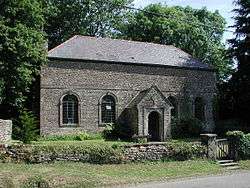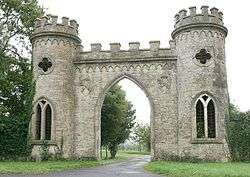Redlynch, Somerset
| Redlynch | |
|---|---|
 St Peter's Church | |
 The Towers | |
 Redlynch | |
| Redlynch shown within Somerset | |
| OS grid reference | ST705335 |
| Civil parish | |
| District | |
| Shire county | |
| Region | |
| Country | England |
| Sovereign state | United Kingdom |
| Postcode district | BA10 |
| Police | Avon and Somerset |
| Fire | Devon and Somerset |
| Ambulance | South Western |
| EU Parliament | South West England |
Redlynch is a village in the civil parish of Bruton within the South Somerset district of Somerset, England.
In the mid-12th century Redlynch belonged to Henry Lovel of Castle Cary.[1] It was later part of the hundred of Bruton.[2]
The Church of St Peter dates from 1750 and was built by Nathaniel Ireson of Wincanton. It has been designated by English Heritage as a Grade II* listed building.[3]
Helena Snakenborg, a lady-in-waiting to Queen Elizabeth I and widow of both William Parr, the Marquis of Northampton, and of Sir Thomas Gorges, died at the age of 86 on 10 April 1635 at Redlynch, the residence of her son, Sir Robert Gorges. She was buried on 14 May in Salisbury Cathedral.
The formal gardens of Redlynch Park, which surrounds Redlynch House, were developed in 1740 on the estate founded by Sir Stephen Fox, paymaster-general to Charles II. Early 20th-century design elements were added by Edwin Lutyens.[1] The east wing of the house was built in the first half of the 18th century by Nathaniel Ireson of Wincanton for the Earl of Ilchester. Information about the Ilchester household at Redlynch survives in the published diaries and correspondence of Agnes Porter, a Scottish-born governess to the second earl's many daughters from 1784 to 1797.[4]
The building was remodelled as a house in 1913, probably by Sir Edwin Lutyens.[5] The west block was previously the stable.[6] Within the grounds are an orangery,[7] summerhouse[8] and walled kitchen garden.[1] The surviving folly known as The Towers is included in the Heritage at Risk Register produced by English Heritage,[9] and the whole park is on the Heritage at Risk register.[10]
During World War II, the United States Army 3rd Armored Division (spearhead) was based at Redlynch Park.[11] Remnants of the entrance bunker are still there along with a plaque thanking the local people.
 Whitehouse Farm
Whitehouse Farm
References
- 1 2 3 "Redlynch Park". Somerset Historic Environment Record. Retrieved 8 February 2008.
- ↑ "Bruton Hundred". A History of Britain. Retrieved 23 September 2011.
- ↑ "Church of Saint Peter". Images of England. Retrieved 8 February 2008.
- ↑ A Governess in the Age of Jane Austen. The Journals and Letters of Agnes Porter, ed. Joanna Martin (London: Hambledon Press, 1998). ISBN 1852851643
- ↑ "East Block, Redlynch Park House, with gates and wing walls on South West corner, and North West corner". Images of England. Retrieved 8 February 2008.
- ↑ "West Block former stable, Redlynch Park House". Images of England. Retrieved 8 February 2008.
- ↑ "The Orangery, 50 metres North of the East and West Blocks, Redlynch Park House". Images of England. Retrieved 8 February 2008.
- ↑ "The Summerhouse, about 70 metres East of East Block, Redlynch Park House". Images of England. Retrieved 8 February 2008.
- ↑ "South West England" (PDF). Heritage at Risk. English Heritage. p. 11. Retrieved 30 June 2010.
- ↑ "Redlynch Park, Bruton / Shepton Montague - South Somerset". Heritage at Risk. English Heritage. Retrieved 19 October 2013.
- ↑ Wakefield, Ken (1994). Operation Bolero: The Americans in Bristol and the West Country 1942-45. Crecy Books. p. 46. ISBN 0-947554-51-3.
External links
![]() Media related to Redlynch, Somerset at Wikimedia Commons
Media related to Redlynch, Somerset at Wikimedia Commons